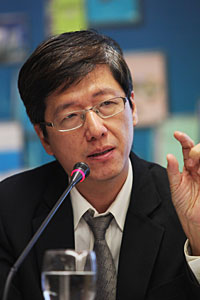
One reason for optimism over inequality in Thailand is that awareness of the problem is far higher these days. And not only in Thailand: the whole world now pays serious attention to the issue as a fundamental problem afflicting modern mankind.
Inequality is more than a money matter. Inequality is unethical. It crushes the basic principle that every person should have equal opportunities. It is also the root cause of many structural problems in Thai society. The lack of social and political stability, the low quality of democracy, the flesh trade and human trafficking, crime, corruption ... you name it. These social evils are different manifestations of structural problems that share the same root cause -- inequality.
The growing awareness of that fact is encouraging. But awareness alone is not enough. We need to go beyond passive acknowledgment, old debates, and piecemeal policies, to push for structural change. If we want to make our society fair, equal, democratic, innovative and safe, we need to tackle inequality by making sure that every person -- regardless of gender, race or belief -- has equal access to life opportunities and justice. Doing so first requires that "we know what we should know" about inequality, which is the focus of this article. In the article that will follow, I will turn to "we do what we should do".
We have known for a long time that inequality manifests in many forms, including geographical disparity and social exclusion of marginalised people such as the stateless, migrant and domestic workers.
As to the causes of inequality, the familiar ones range from intergenerational inequality when rich-poor gaps transmit from generation to generation, disparity in education in both quality and the level completed, unequal access both to credit and the skills necessary for a modern economy, and legal discrimination.
Social connectedness ("who you know") is another factor determining unequal outcomes both economically and politically.
All this is "old knowledge". We have known it for ages and yet knowing it does not seem to enable us to reduce or prevent inequality from rising. We have to admit that our knowledge of inequality is insufficient. So what more is there to know? I think there are at least six things we should know better about inequality in Thailand.
First, we need to admit that Thailand is among the 10 most unequal countries on this planet for wealth distribution. It is reasonable to think that there must be more structural problems behind the above-mentioned usual causes of inequality. I believe these problems lie in our social and political system. Many research studies have pointed to this aberration. They reveal the country's extreme concentration of economic power controlled by a handful of billionaires, declining competitiveness in the private sector, and worsening corruption. Corruption has become commonplace, and very easy to conduct, most notably by the well-connected higher strata of society. This way of accumulating wealth deepens inequality even further.
Second, while the gaps between Thais in accessing "basic" social services such as education and healthcare narrow, the gaps in accessing "high quality" services are widening. For example, children from wealthy families have more opportunities to enter prestige universities and gain higher knowledge and skills. Richer Thais have more access to premium healthcare services, and live longer. Evidence abounds that gaps between the very wealthy and the middle class and lower strata in society are growing ever wider.
Third, we should be aware that Thailand may now host a substantial number of the chronically poor. I began to suspect this after seeing increases in the poverty rate in 2016 and 2018 despite considerable economic growth of over 3-4%. If this is true, as much as 10% of the population may have fallen into chronic poverty, which would make tackling inequality even more difficult.
Fourth, disruptive technology may be very harmful and worsen inequality more than did any past technological breakthrough.
Fifth, many countries in Europe with low inequality have won admiration from Thais. Yet few know that the use of fiscal policy to provide universal social welfare benefits across the board is the main reason for their equitable societies. This ignorance has resulted in resistance to universal welfare among many Thais.
In low-inequality countries, welfare benefits are not considered charity but a legal right. Everyone in the country is entitled to that same right. Every child has the same access to free quality education to high school level at a minimum, with the aim of helping everyone to realise their full potential. The universal welfare benefits cover sickness, unemployment, and disabilities. Such thorough benefits provide equal opportunities and strong social safety nets for all, so people do not have to fear the uncertainties that life may bring. Such life security is good for business too. Entrepreneurs can focus solely on managing business risks as their lives are already protected by the comprehensive social welfare system. That can bring more investment, including high-quality small and medium-sized enterprises (SMEs), which in turn can help make universal welfare affordable.
Sixth, lack of cash is not just a definition of poverty, it is a major constraint in itself. Policymakers need to realise this fact to form effective poverty alleviation measures. If the poor receive money or other forms of financial aid regularly and sufficiently, they can use the cash to break the chains and rise above poverty by themselves. For example, they can use the money directly to improve their skills and knowledge or to invest in their businesses.
A level playing field, comprehensive welfare services for life security across the board, and investment in human capital without discrimination are the key solutions.
Thailand needs to make this happen if we want to eradicate inequality. When that happens, an open society and democracy are not far behind.
